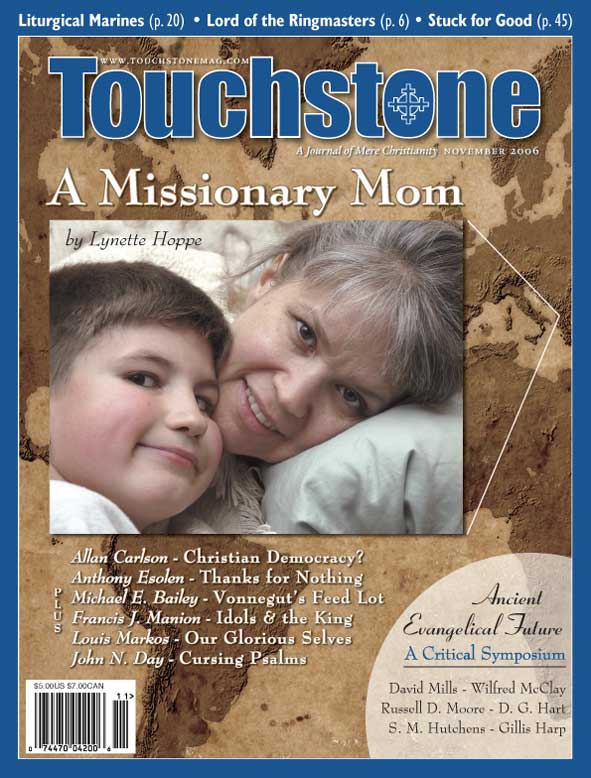Idols & the King
Francis J. Manion on What the First Commandment Has to Do with the Fourth of July
The Supreme Court’s recent foray into the “Ten Commandments Wars” presented Christians with an opportunity to rob the secularists of one of their most cherished and effective arguments, but sadly, Christians muffed it. By focusing almost exclusively on those provisions of the Decalogue with more obvious secular applications—the “Second Table”—while passing over in embarrassed silence those commands of the “First Table” forbidding the worship of idols, defenders of America’s surprisingly commonplace public depictions of the Ten Commandments (with one exception) practically ceded the field to the currently dominant secularist schools of political science and legal history.
Those schools were represented at the Supreme Court by a group of thirty-one impressively credentialed legal historians and scholars—among them scholars from Baylor, UCLA, University of Virginia, Michigan State, and William and Mary—whose amicus curiae brief filed in support of the ACLU in American Civil Liberties Union of Kentucky v. McCreary County took the position that “to claim that the Ten Commandments has a special place in the development of American law lacks historical support.” In other words, the references in hundreds of judicial opinions and the writings of political figures to the Decalogue’s foundational role, no less than the widely shared popular assumption of such a role, have as much value as the tale of George Washington and the cherry tree.
The reluctance of those favoring Commandments displays to engage the issue at anything more than a superficial level may be attributable to fear of the secularists’ rhetorical ace-in-the-hole, an ace played memorably by Justice John Paul Stevens against the late Chief Justice Rehnquist in a case about an Indiana city’s display of a Ten Commandments monument.
Stevens was widely considered to have carried the day against Rehnquist’s attribution of a secular role for the Decalogue by pointing to the first and largest words carved on the monument: “I Am the Lord thy God. Thou shalt have no other gods before me.” Case closed.
Or is it? For despite the sheepishness of the defenders of such displays and the smirking self-confidence of the anti-display faction (“there is no road leading from Sinai to Philadelphia,” sniffs the ACLU in its briefs), there actually is considerable evidence for the idea that the First Commandment—with its one transcendent, jealous Deity who brooks no rivals—was not merely influential, but essential, in that confluence of historical, political, and philosophical streams that produced the Declaration of July 4, 1776.
The Whig Road
One need not be a Whig, nor approve of all that Whiggery hath wrought, to recognize that there actually is a road from Sinai to Philadelphia and that it runs for a fair stretch through the seventeenth-century English struggle between radical republicans (Whigs) and the defenders of Divine Right. One of the leading opponents of the claims of royal absolutism was Algernon Sidney.
A leader of the Puritan Commonwealth who later opposed Cromwell, he went into voluntary exile on the Continent after the restoration of the monarchy. Returning to England in 1677, he once again involved himself in politics as an outspoken opponent of what he and other Whigs considered the tyrannical aspirations of Charles II. He went to the scaffold for high treason in 1683.
Jefferson would rank him on a par as a political theorist with John Locke. He included Sidney’s Discourses Concerning Government with Locke’s Second Treatise on Government, the Declaration of Independence, The Federalist Papers, the Virginia Resolution of 1799, and Washington’s Farewell Address to be used in his University of Virginia School of Law as “the best guides” to the distinctive principles of American government.
Sidney’s Discourses were republicanism’s answer to Sir Robert Filmer’s Patriarcha. Filmer, a prominent English apologist for Divine Right theory, railed against the “desperate assertion” of Jesuits like Robert Bellarmine and Francisco Suarez that political power “depends upon the consent of the multitude.”
Francis J. Manion is Senior Counsel for the American Center for Law and Justice (www.aclj.org), a public interest law firm specializing in First Amendment issues. He has argued more than a dozen cases in the federal courts on the display of the Decalogue on public property and also specializes in representing pro-life healthcare professionals faced with issues of conscience arising in the workplace. He and his wife Mary have ten children and six grandchildren. They live in Bardstown, Kentucky, where they attend the Basilica of St. Joseph Proto-Cathedral.
subscription options
Order
Print/Online Subscription

Get six issues (one year) of Touchstone PLUS full online access including pdf downloads for only $39.95. That's only $3.34 per month!
Order
Online Only
Subscription

Get a one-year full-access subscription to the Touchstone online archives for only $19.95. That's only $1.66 per month!
bulk subscriptions
Order Touchstone subscriptions in bulk and save $10 per sub! Each subscription includes 6 issues of Touchstone plus full online access to touchstonemag.com—including archives, videos, and pdf downloads of recent issues for only $29.95 each! Great for churches or study groups.
Transactions will be processed on a secure server.
more on America from the online archives
more from the online archives
calling all readers
Please Donate
"There are magazines worth reading but few worth saving . . . Touchstone is just such a magazine."
—Alice von Hildebrand
"Here we do not concede one square millimeter of territory to falsehood, folly, contemporary sentimentality, or fashion. We speak the truth, and let God be our judge. . . . Touchstone is the one committedly Christian conservative journal."
—Anthony Esolen, Touchstone senior editor












